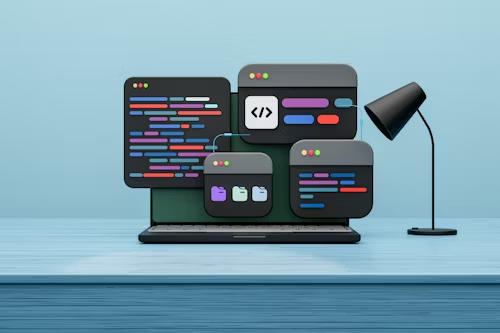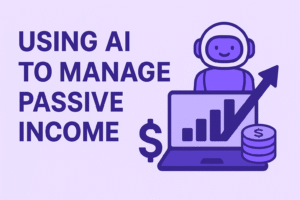Learning to code can feel like trying to solve a Rubik’s Cube blindfolded. I’ve been there. You watch one YouTube tutorial, think like a genius, then open your text editor and boom, error messages, confusion, and a slow descent into keyboard-smashing frustration.
But here’s the twist: AI has completely changed the game.
I’m going to walk you through how I used AI to learn Python, fix my JavaScript mistakes faster, and understand concepts that even my college textbooks couldn’t explain without sounding like a legal contract. Whether you’re a total beginner or someone who’s tried and rage-quit before, this blog is for you.
Let’s break it down.
Why AI Makes Coding Easier
Learning to code is hard because most resources expect you to think like a computer. AI flips that. It meets you where you’re at, confused, curious, and probably staring at Stack Overflow like it’s written in Latin.
AI tools can:
- Explain the code to you
- Give feedback instantly
- Help you build real projects.
- Spot your errors before you even realize something’s wrong.
It’s like having a private tutor who works 24/7.
My Favorite AI Tools for Learning to Code
These are the exact tools I’ve used and still use. Some are free, some have premium features, but all of them have saved me hours of frustration.
1. Replit Ghostwriter
Best for: Writing and debugging code in real time
Free/Paid: Free with limited access, paid version starts at $10/month
Replit isn’t just a coding environment, it’s like having a buddy who fixes your code while you type it. Ghostwriter (Replit’s AI assistant) has helped me complete Python exercises, debug syntax errors, and even write entire functions based on a one-line description.
You type, it guesses what you’re trying to do, and it works. It’s almost creepy how good it is sometimes.
2. ChatGPT
Best for: Quick explanations, solving bugs, and getting unstuck
Free/Paid: Free version available, Pro with GPT-4 costs $20/month
ChatGPT is my go-to when I hit a wall. I once asked it why my if statement wasn’t working in JavaScript, and it not only explained the problem but rewrote my logic more cleanly. It’s fast, accurate, and doesn’t talk to you like a textbook.
Sometimes I just paste my whole code and say, “Why is this not working?” and it breaks it down line by line like a patient mentor. I wish I had this thing when I was failing my intro-to-programming class.
3. Codeium
Best for: Autocomplete and learning while coding
Free/Paid: Completely free
Think of Codeium like auto-suggest on steroids. As you type, it predicts what you’re trying to code next, and it’s shockingly accurate. It doesn’t just save time; it teaches you by showing better ways to write what you were trying to write.
4. Notion AI + Coding Templates
Best for: Planning your learning journey
Free/Paid: Free plan available, AI tools require premium
I use Notion to track my coding progress, and the AI inside helps break complex concepts into steps I can follow. I’ve used it to build mini-courses for myself, “10 Days to Learn Python Basics” style, and it keeps me motivated when my brain wants to give up.
Real Example: Learning Python with AI in 2 Weeks
When I decided to learn Python, I used Replit, ChatGPT, and Codeium every single day.
Here’s how it looked:
- Day 1–3: Simple print functions and variables. Replit helped me see what I was doing right.
- Day 4–7: If-statements, loops, and small scripts. ChatGPT answered my constant “why isn’t this working” questions.
- Day 8–14: Building a basic calculator, using user input, and handling errors. Codeium completed half my code before I even finished typing.
The results? I was doing things. Not just watching tutorials but building stuff that worked.
Tips for Beginners Using AI to Learn Code
- Start Small, Build Daily
Don’t try to learn everything in one sitting. Let AI guide you a bit each day. It adds up faster than you think. - Ask Dumb Questions
Seriously. “What does ‘int’ mean?” or “Why is there a colon here?” AI doesn’t judge. That’s the beauty of it. - Debug With AI First
Instead of spending an hour scrolling forums, paste your broken code into an AI tool and ask what’s wrong. Most of the time, it’ll spot the issue instantly. - Use AI as Feedback, Not a Crutch
It’s tempting to let AI write all your code. Don’t. Write it yourself first, then ask AI how to make it better. That’s where the real learning happens.
Final Thoughts
If you’re sitting there thinking, “I’m too dumb for coding,” stop. You’re not. You just haven’t had the right tools or the right teaching style. AI fixes both of those.
I wish I had these tools years ago when I gave up on C++ after one terrible week. Today, I can build small apps, automate boring stuff, and even help friends debug their code, all thanks to AI.
Don’t wait. Pick one tool, start small, and see what happens.




